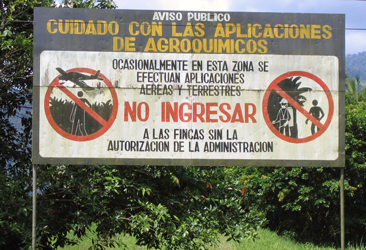Pesticide Risk and Plant Disease Governance
Pesticide risks and plant diseases are of concern to the larger population. Pesticides are the only toxics we release deliberately into the environment. Criticism of pesticides lies at the roots of environmental sciences and risk governance, and of the organic agriculture movement. Plant diseases may affect very large areas and do not recognize frontiers. Pesticide risks and plant diseases ask for collective responses, generally involving the state and science. This involves interactions between the state, civil society, science, and market actors. To understand them in all their complexity we need to combine technical and social science. In this research programme, I explore different social science questions that are complementary to natural science approaches and of relevance to anyone interested in addressing pesticide risk and reducing negative impacts of transboundary plant diseases and pests.

Multiple risk perceptions
This research starts from the premise that technical risk analysis is embedded in, and will necessarily encounter, multiple views on risks. Risk selection is a social process. Risk reduction strategies enter an arena of contesting views on the nature of risks and solutions to address them. The study of blaming provides insight into social cleavages and contradictions. I use ethnographic material to analyse risk narratives. A long-term challenge is how to capture the social construction of risk in relation to the reality of hazard. This research has led to publications on crisis discourses around large disasters, the role of social movements in influencing risk governance, framing by state and business that invokes ignorance as an explanation for harm and is rooted in a deficit-of-knowledge model.

Global pesticide governance, local translations
What happens when global models for the management of pesticide risks are translated into policies and practices at the national level? I have examined the translation of the FAO Code of Conduct into policies in Central America (see the publication in World Development) and the evolution of the Rotterdam Convention. An interesting question that still needs further examination concerns the long-term effect of such initiatives on the availability of hazardous pesticides. Another point for debate is how such global governance models intend to counter uneven development but are affected in their implementation by the very dynamics of inequality-related institutional capacities to address risks. Adriana Ríos González explored in her PhD thesis whether relatively simple technical risk models can support risk governance in countries such as Mexico.

The role of business in risk regulation
The framing of pesticide risks cannot be uncoupled from interests and the wider political economy. The main source for information about risks in pesticide regulation is the pesticide industry. This raises questions about the influence of businesses on pesticide regulation or, in more general terms, about the social interaction between pesticide industry, science advisors and state agencies in the making and implementation of risk regulation. In the long-term such research will have to contribute to normative questions such as: Who is to determine the harmfulness of products? Who should own or control the risk data? And what is to count as sufficient proof for classifying a product or application method as safe?

Plant disease governance as public good
This research raises the question under what conditions should plant disease control be seen as a public good. In other words, what are the roles of state, market actors and civil society in this respect in a time of neoliberalization? This research started with work with Kazbek Toleubayev on locust control (or the lack of it) in Central Asia. Ongoing is research on the ways by which the current global governance infrastructure responds to the threat of Tropical Race 4 of Fusarium wilt (Panama Disease) in bananas. It is predicated on the assumption that policy prescriptions are rarely simply outcomes of sterile scientific experimentation but are imbued with and mediated by the values, biases and strategic considerations of policy actors. Doctoral researcher Jaye de la Cruz compares Fusarium wilt – related policies at international level and at the national level of selected countries. See www.panamadisease.org
- Back to research on Political Ecology and Agrarian Questions
- or continue to Thesis Supervision and Teaching
- or go to Publications